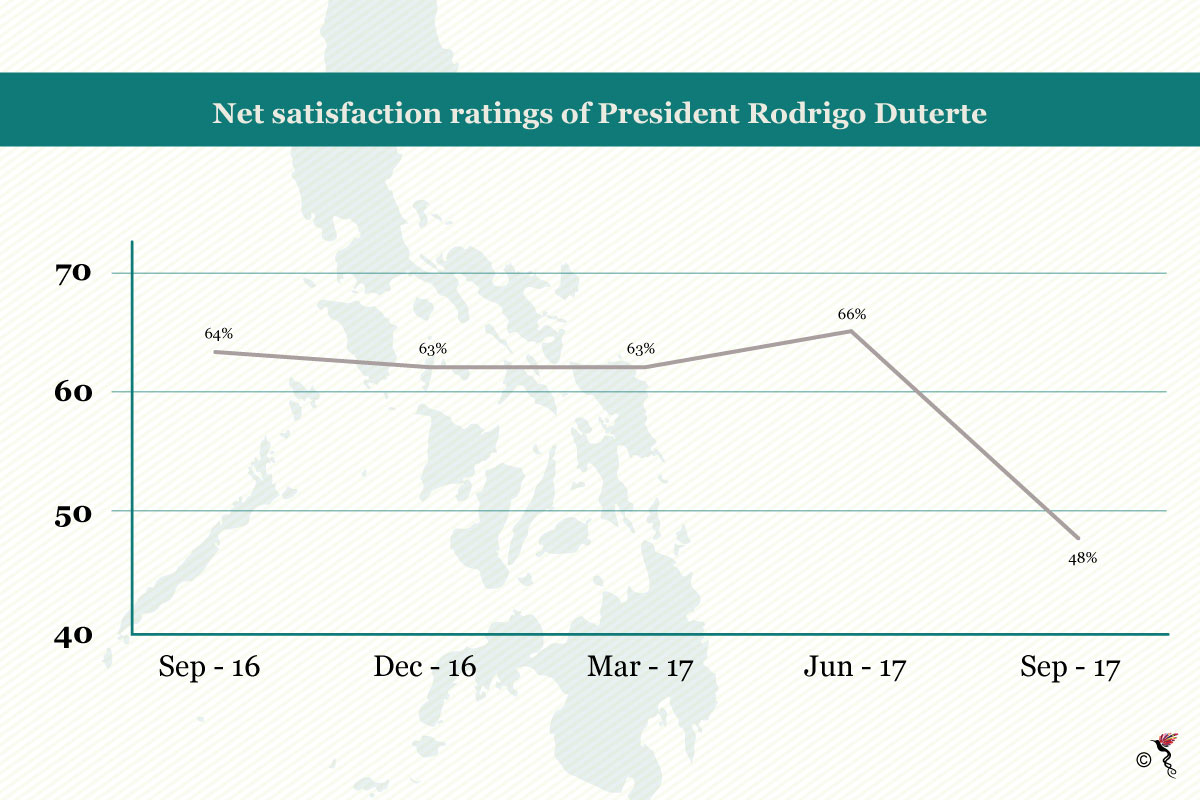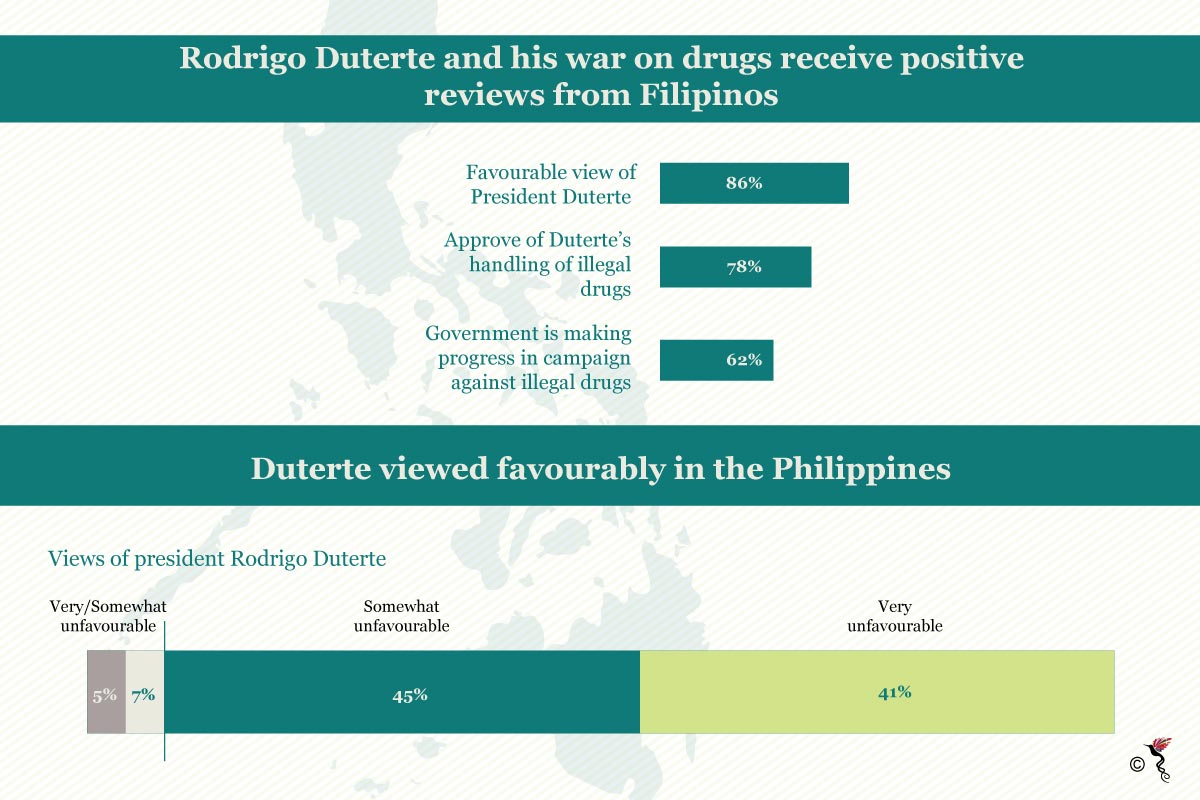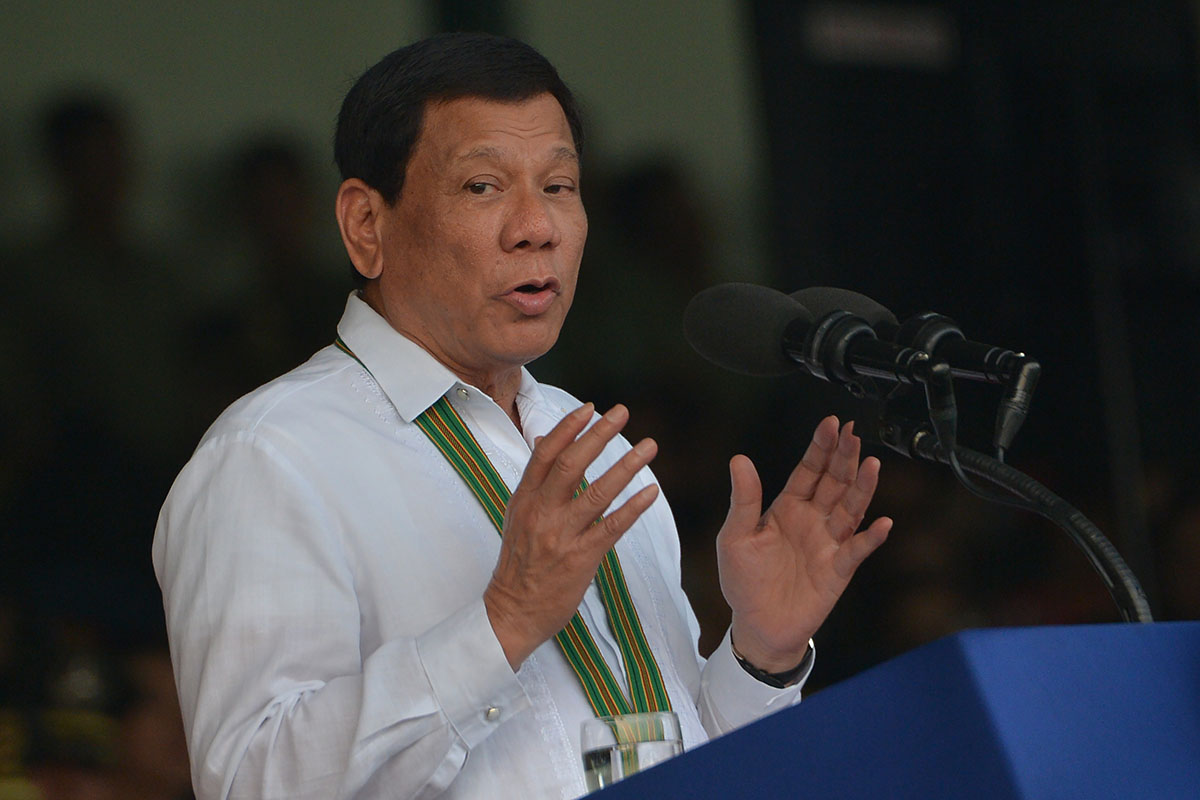A recent poll conducted by the Philippine-based SWS (Social Weather Stations) showed that President Rodrigo Duterte’s satisfaction ratings has slumped 11 points from 78 percent in June to 67 percent. This leaves his net satisfaction rate (percentage satisfied – percentage dissatisfied) at 48 percent – a decline of 18 points from a net satisfaction rate of 66 percent in June this year.
His trust ratings also took a hit as it fell nine points from 82 percent to 73 percent. Most of those who disapprove of the outspoken leader came from those living in urban areas and from poor families.
Duterte’s satisfaction ratings also fell amongst the younger generation. 70 percent of those between the ages of 25 and 34 were satisfied with their President compared to 79 percent in June. Meanwhile, 72 percent of high school graduates were satisfied with him compared to 75 percent in June. Nevertheless, he is still placed in the “Very Good” category, the second best after “Excellent”.

Net satisfaction (percentage satisfied – percentage dissatisfied) ratings of President Rodrigo Duterte. Source: Social Weather Stations.
In response to the survey, Presidential Spokesperson Earnesto Abella attributed the drop to the end of the honeymoon period for the president but reassured that “people are still in general satisfied."
“These things usually happen. They have been traditionally happening after a year or a year and a half. But the love is still there,” he quipped.
He also claimed that the survey represented a snapshot of the public's mood and since the survey was conducted two days after protests against the drug war, it is likely that those events had an impact on the collection of survey data.
“The SWS survey was conducted between September 23-27, just 2 days after the National Day of Protest – the bold initiative by the President allowing citizens to freely vent their grievances about the excesses and shortcomings of the government – and some sentiments may have spilled over,” Abella noted.
One of the main suspects for Duterte’s tumble in his satisfaction ratings is his brutal campaign on drugs. Since he assumed office of President in May of last year, over 7,000 deaths from extrajudicial killings have been reported. His administration claims that all those killed during drug operations conducted by the police were in fact criminal drug dealers.
Executive Director of the Manila based Institute for Political and Electoral Reform, Ramon Casiple believes that the drug war may have played a part but this needs to be evaluated carefully since the affected communities are relatively few compared to the total.
“There is still a high level of support for him. However, the drop can also be construed as a warning to the Duterte administration to shape up and change policies or key people wherever necessary to regain public trust and satisfaction,” he said in an email reply to The ASEAN Post.
While the killings have been going on for some time now, Duterte continued to enjoy immense support from his citizenry. A Pew survey which collected data from February till May of this year reported high approval ratings of Duterte by his people. 86 percent of those polled viewed him as "very favourable" or "somewhat favourable." Aside from that, 82 percent approved of his handling of illegal drugs.

Data on domestic perception of Duterte. Source: Pew Research Centre.
In another survey conducted by SWS, 73 percent of adult Filipinos were worried that they, or someone they know, will be a victim of extrajudicial killings. 90 percent of those polled also believed that drug offenders should be captured alive.
The Philippine CHR (Commission on Human Rights) in a statement published yesterday echoed the sentiments of those expressed in the survey and called on the PNP (Philippine National Police) to broaden the definition of extrajudicial killings from the pre-existing one.
“The CHR insist that extrajudicial killings ‘encompasses any killing by Government forces as well as killings by any other groups or individuals which the Government fails to investigate, prosecute and punish when it is in a position to do so,’ as defined by former UN Special Rapporteur Philip Alston. Limiting the definition of extrajudicial killings based only on a focused operational definition provided in the Administrative Order 35 would discount killings that are also perpetrated by state agents and non-state actors that remain un-investigated,” the commission said in a statement.
Technically, there has not been a single offence of that nature committed by the police force under the present definitions of extrajudicial killings.
When asked if Duterte would now ease his anti-drug efforts, Casiple responded that it is a possibility as the Philippine government is recognising it as one source of public dissatisfaction.
“However, the tendency at the moment is defensive and to reject any suggestion that there are extrajudicial killings,” he added.
Even with the decline in his ratings and recent public outcry, it is unlikely that we would see this strongman of a president yield to such pressures anytime soon. After all, he said that just because some of them who died may even be teenagers, “it doesn’t mean to say you have to stop” shortly after the highly condemned shootings of two teenagers by the police.
